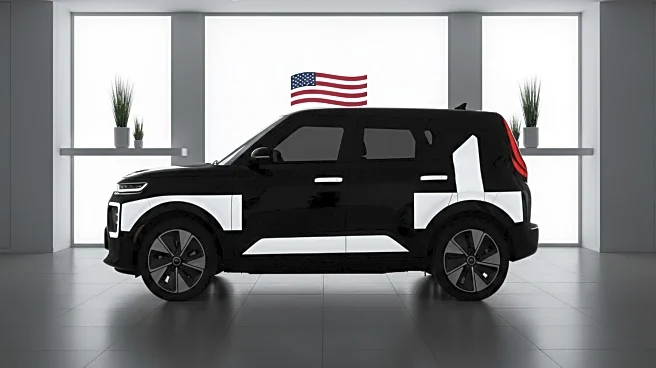What's Happening?
Kia America has announced the retirement of the Kia Soul, a popular urban vehicle, at the end of the 2025 model year. Since its introduction in 2009, over 1.5 million units have been sold in the U.S., contributing significantly to Kia's growth in the American market. The Soul, known for its distinctive design and marketing campaigns featuring music-loving hamsters, has been a cornerstone in Kia's transformation and expansion in the U.S. automotive industry. Eric Watson, Vice President of Sales at Kia America, highlighted the Soul's role in Kia's success, noting its contribution to the brand's increasing market share and sales records.
Why It's Important?
The retirement of the Kia Soul marks the end of an era for Kia America, as the vehicle has been instrumental in attracting new customers and establishing Kia's presence in the U.S. market. The Soul's unique design and marketing strategies have helped Kia differentiate itself from competitors, contributing to its growth and success. The decision to retire the Soul reflects Kia's strategic shift towards expanding its utility vehicle lineup, which is expected to continue driving sales and market share growth. This move may impact consumer choices and the competitive landscape in the compact vehicle segment.
What's Next?
As Kia phases out the Soul, the company is likely to focus on promoting its other utility vehicles, such as the Kia Seltos, which offers features like increased cargo space and all-wheel drive. Kia's future strategy may involve further innovation in vehicle design and marketing to maintain its competitive edge. The company may also explore new opportunities in the electric vehicle market, aligning with industry trends towards sustainability and electrification. Consumers and industry stakeholders will be watching Kia's next steps closely as it navigates this transition.
Beyond the Headlines
The retirement of the Kia Soul may have broader implications for the automotive industry, particularly in terms of design innovation and marketing strategies. Kia's success with the Soul demonstrates the potential for unconventional vehicle designs and creative marketing to resonate with consumers. As the industry evolves, other automakers may look to Kia's approach as a model for engaging new demographics and driving brand growth. Additionally, the shift towards utility vehicles and electrification reflects broader industry trends that could influence future vehicle development and consumer preferences.











